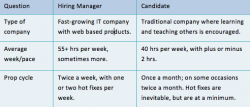
Technical screening is testing candidates in order to identify those with particular characteristics listed in a job description. This can be done in order to avoid the unnecessary cycles of presenting several candidates for interview who are rejected either because the job description was misunderstood or the candidate screening process was ineffective, or a combination of both.
I get into this more in an upcoming Journal of Corporate Recruiting Leadership, but wanted to give you a taste of all this concept today.
During a training session with technical recruiters, we reviewed a C# Developer job description that was posted on their corporate website. The job description was seeking a mid-level developer with 1 to 2 years development (C#, ASP.NET, SQL Server, and Web Services) and analytical experience, who also had experience in SQL Server Reporting Services (SSRS) and SQL Server Integration Services (SSIS).
On reviewing the job description, I saw bright red flags and proceeded to explain.
First the notion that a mid-level developer would have 1-2 years experience is not entirely correct. Mid-level experience is closer to 4-6 years. The second flag is the requirement for the mid-level C# developer to have experience in SSRS and SSIS. It is very possible for a mid-level C# developer to have experience in SQL Server, but not to the extent of having experience in SSRS and SSIS. After highlighting other mismatches in the job description, it was very apparent to me that the hiring manager was looking for a SQL Server Developer with C# development experience and not a C# Developer. No sooner had I finished that sentence than a recruiter in the session informed me that the candidates sent to interview with the hiring manager were rejected, and that the hiring manager later informed the recruiter that the requirements and title of the position were to be changed to SQL Server Developer instead of C# Developer. The hiring manager had found out during the interviews that their need was for a SQL Developer instead.
This was a case of a misunderstood job description. For the issue of ineffective candidate screening, Kerri, a technical recruiter with 11 years’ experience asks “How do I validate technical skills to know if the candidate really has the skills or not?”
The answer is simple: Technical Screening. It involves three steps:
- Evaluate the Job Description
- Review the Resume
- Create Technical Screening Questions
Job Description Evaluation: Job description review is where technical screening and skills matching starts to either come together or fall apart. The first thing to do is to ensure that all the skill sets and technical terms are understood, i.e. what they mean and how they are used in the context of the job. The second is to find and answer all the questions that arise from the job description with the help of the hiring manager.
Resume Review: Aside from matching the technical skills of the requirements with that of the candidate’s resume, there are other aspects of the position and its technical environment that affect the compatibility of a candidate to a job. These are the pace of development/work, the project team makeup, type of organization, etc. Review the resume to find questions and answers that either complement or are inconsistent with the job description.
Above, the graphic in the upper right (click to enlarge), is an example of disparity between a candidate and hiring manager after a job description and resume review. It becomes clear that this may not be a good match, irrespective of how compatible the resume is with the job description.
Technical Screening Questions: At this point screening questions should be building up from reviewing the job description and resume. What can we find out about this candidate that will be attractive to the hiring manager (vice versa)? What makes this candidate tick? Looking at a SharePoint Developer (.Net) job description and resume, these are some questions that may be asked.
Background
- What is the makeup of your development, testing, and production environments? How many servers do you have in each environment?
Specific to Job Description
- How did you start your career in SharePoint development? Am I correct to say you have about five years (interject the years of experience you’ve heard the candidate say) experience in SharePoint Development?
Specific to Resume
- Could you tell me about the MOSS and .NET based Enterprise Content Management System — what problem did this solve?
The great thing about technical screening questions is that the answers can be verbiage used by the recruiter to create captivating candidate profiles that describe key strengths to the hiring manager. The most important of all the advantages of this screening process is that the recruiter is able to recognize (with supported information), if the candidate has the characteristics listed in the job description.
Using the tips outlined above, you see that the screening process starts with understanding the intent of the job description. Every minute spent learning more about the job description helps boost a recruiter’s confidence and ability to validate technical candidates for a successful match. When you continue to do this on a regular basis, don’t be surprised when three things start to happen: a) your clients request your recruiting services on an on-going basis, b) your candidates send you more referrals and c) you are able to do more in less time.